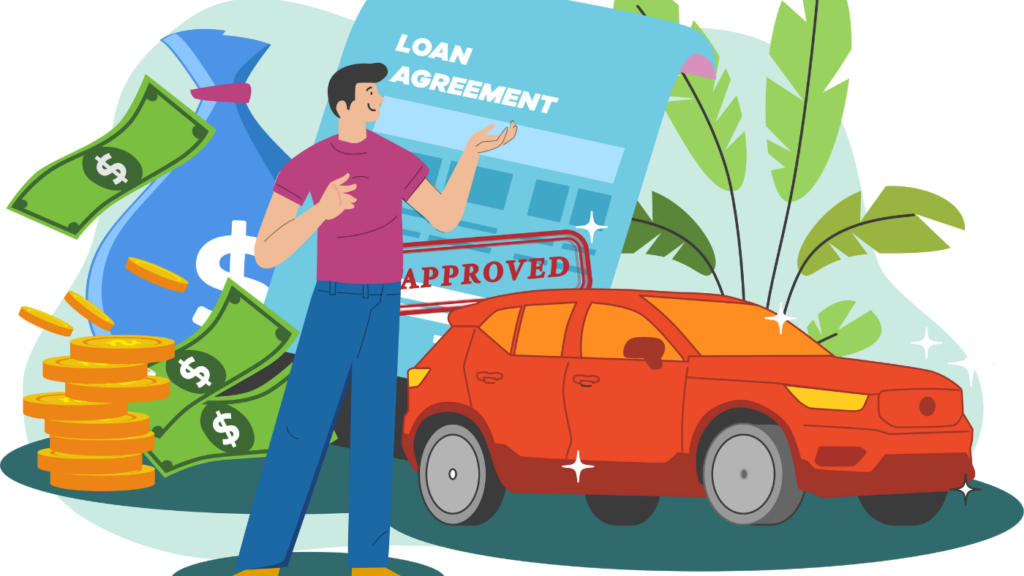Learning how to negotiate a car loan is an essential skill for any car buyer in Canada. With average car loan interest rates ranging from 6% to 8% for new cars and 8% to 10% for used cars in 2025, securing a lower interest rate can lead to substantial savings over the life of your loan. This comprehensive guide will equip you with the knowledge and strategies needed to negotiate the best possible terms, ensuring you drive away with both your dream car and a financial plan that fits your budget. For more information on car loans and to get quick approvals, visit Quick Approvals. According to the Financial Consumer Agency of Canada, shopping around for the best rates is crucial. This article covers everything from understanding loan terms to effective negotiation tactics, avoiding pitfalls, and addressing special cases like bad credit.
Understanding Car Loan Terms in Canada
Before diving into how to negotiate a car loan, it’s vital to grasp the key components of a car loan. Understanding these terms empowers you to make informed decisions and negotiate effectively.
- Interest Rate: The percentage charged by the lender for borrowing money. In Canada, rates vary based on credit score, lender, and vehicle type.
- APR (Annual Percentage Rate): Includes the interest rate plus fees, offering a complete view of the loan’s cost.
- Loan Term: The repayment period, typically 36 to 96 months. Longer terms lower monthly payments but increase total interest.
- Down Payment: The upfront payment that reduces the loan amount, often leading to better terms.
- Monthly Payment: The amount paid monthly, covering principal and interest.
- Total Cost: The sum of all payments, including interest, over the loan term.
For example, a $25,000 car loan at 5% interest over 36 months costs $26,974, while the same loan over 84 months costs $29,681, highlighting the impact of loan terms (Financial Consumer Agency of Canada).
How to Prepare for Car Loan Negotiation in Canada

Preparation is the foundation of successful how to negotiate a car loan. By understanding your financial position and market conditions, you can approach lenders with confidence.
Checking Your Credit Score
Your credit score, ranging from 300 to 900, significantly affects loan terms. Scores above 720 often qualify for the best rates, while scores between 630-700 may need improvement. Obtain your credit report from Equifax or TransUnion to assess your creditworthiness.
Improving Your Credit Score
If your score is low, take steps to improve it before applying. Pay down debts, make timely payments, correct report errors, and avoid new credit applications. Even a modest increase can secure better rates.
Getting Pre-Approved for Financing
Pre-approval from banks, credit unions, or online lenders like Quick Approvals provides a baseline interest rate and loan amount. This strengthens your negotiating position, as you can compare dealership offers against your pre-approved terms.
Researching Current Rates
Stay informed about average car loan rates in Canada, which are around 6-8% for new cars and 8-10% for used cars in 2025. Resources like Ratehub.ca provide up-to-date data to identify competitive offers.
Setting a Budget
Determine your affordable car budget, including down payment, monthly payments, insurance, and maintenance. Experts recommend car payments be 10% or less of your monthly take-home pay, with total car expenses below 20%.
Best Strategies for Car Loan Negotiation in Canada

Effective best strategies for car loan negotiation in Canada involve leveraging preparation and persistence to secure favorable terms.
- Compare Multiple Offers: Obtain quotes from various lenders to find the lowest rates. Use these as leverage when negotiating with dealerships.
- Use Pre-Approvals: Present your pre-approved offer and ask the dealer to beat it. For example, if pre-approved at 4%, request a rate closer to 2.5%.
- Be Persistent: Don’t accept the first offer. Politely ask for a better rate and be prepared to negotiate multiple times.
- Focus on Total Cost: Avoid fixating on monthly payments alone, as longer terms can increase interest costs.
- Be Ready to Walk Away: If terms aren’t favorable, be willing to visit another dealership, which may prompt better offers.
Timing your negotiation at the end of the month, when dealers aim to meet sales goals, can also improve your chances of securing a better deal.
How to Negotiate Car Loan Interest Rates in Canada
Negotiating interest rates is a critical aspect of how to negotiate a car loan. Here’s how to approach it:
First, ensure your credit score is as high as possible, as lenders offer lower rates to those with scores above 700. Next, use your pre-approved offers to challenge the dealer’s rate. For instance, if your bank offers 4%, ask the dealer to match or beat it. Be respectful but firm, and if the rate isn’t competitive, consider other lenders. The RBC Financing Guide emphasizes the importance of comparing rates to find the best deal.
How to Get a Lower APR on Car Loans in Canada
Securing a lower APR involves similar strategies but focuses on the overall cost of the loan. A larger down payment, such as 20% or more, can reduce the financed amount and often leads to a lower APR. Shorter loan terms also tend to have lower APRs, as lenders face less risk. Compare APRs across lenders, as fees can significantly affect the total cost. Avoid add-ons like extended warranties, which can increase the APR if financed.
Negotiating Car Loans with Dealerships in Canada

Negotiating car loans with dealerships in Canada requires specific tactics to navigate their sales strategies.
- Negotiate the Car Price First: Agree on the vehicle’s price before discussing financing to avoid inflated loan terms.
- Research Vehicle Value: Use resources like Canadian Black Book to determine fair market value.
- Connect with the Sales Manager: Build a relationship to ensure better communication and terms.
- Use Vehicle History Reports: Obtain a CARFAX Canada report to identify issues that can be leveraged in negotiations.
- Time Your Visit: Visit on the last day of the month when dealers are motivated to meet quotas.
Maintain a calm demeanor and be prepared to walk away if the terms don’t meet your expectations.
What to Say When Negotiating a Car Loan in Canada
Knowing what to say when negotiating a car loan in Canada can make a significant difference. Here are some key phrases:
- “I have a pre-approved offer at [rate]. Can you beat it?”
- “What’s the lowest APR you can offer on this loan?”
- “Can you remove any additional fees or prepayment penalties?”
- “I’m comparing offers from multiple lenders. What’s your best deal?”
Be polite but assertive, and avoid sharing your desired monthly payment early, as dealers may extend the loan term to meet it, increasing total costs.
Average Car Loan Interest Rates by Loan Type and Term in Canada (2025)
| Loan Type | Average Rate | 36-month | 48-month | 60-month | 72-month | 84-month |
|---|---|---|---|---|---|---|
| New Car Loan | 6-8% | 6-8% | 7-9% | 8-10% | 9-11% | 10-13% |
| Used Car Loan | 8-10% | – | – | – | – | – |
Questions to Ask During Car Loan Negotiation in Canada
Asking the right questions to ask during car loan negotiation in Canada ensures transparency and better terms. Consider these:
- What is the APR, including all fees?
- Are there any prepayment penalties?
- Can you match or beat my pre-approved rate?
- What additional fees are included in the loan?
- Is the interest rate fixed or variable?
These questions help you understand the full scope of the loan and identify areas for negotiation.
Common Mistakes in Car Loan Negotiation in Canada

Avoiding common mistakes in car loan negotiation in Canada is crucial for a cost-effective loan.
- Focusing Only on Monthly Payments: This can lead to longer terms and higher interest costs.
- Accepting Add-Ons: Decline overpriced extras like GAP insurance unless necessary.
- Not Checking for Penalties: Ensure there are no prepayment penalties that could limit refinancing options.
- Neglecting Vehicle Price: Always negotiate the car price separately to avoid inflated loan amounts.
By steering clear of these pitfalls, you can secure a loan that aligns with your financial goals.
How to Negotiate a Car Loan with Bad Credit in Canada
How to negotiate a car loan with bad credit in Canada is challenging but possible with the right approach. Bad credit loans often have rates as high as 14-29.99%, so focus on these strategies:
- Offer a Larger Down Payment: This reduces the lender’s risk and may lower the rate.
- Highlight Stable Income: Provide proof of consistent income to demonstrate repayment ability.
- Work with Credit Unions: They may offer more flexible terms for those with bad credit.
- Consider Co-Signers: A co-signer with good credit can improve your chances of better terms.
Explore options at Quick Approvals for tailored solutions for bad credit borrowers.
Average Car Loan Interest Rates by Credit Score in Canada (2025)
| Credit Score Range | Average Rate |
|---|---|
| 800+ | Under 6% |
| 740-799 | 7-9% |
| 680-739 | 9-12% |
| 630-679 | 12-17% |
| Under 630 | Higher rates |
Tips for Negotiating Auto Loan Terms in Canada
Tips for negotiating auto loan terms in Canada include being flexible with loan terms, such as choosing a shorter term for lower interest or a longer term for affordable payments. Negotiate to remove unnecessary fees, like dealer administration fees, and ensure the loan aligns with your budget. Regularly monitor rates post-purchase for refinancing opportunities if rates drop.
Frequently Asked Questions
How can I negotiate car loan interest rates in Canada?
To effectively negotiate car loan interest rates in Canada, start by improving your credit score, as scores above 700 qualify for better rates. Get pre-approved from multiple lenders to use as leverage. Politely ask the dealer to beat your best offer, and be persistent. For example, if pre-approved at 4%, request a rate closer to 3%. Compare APRs to ensure the lowest overall cost (RBC Financing Guide).
What are the best strategies for car loan negotiation in Canada?
The best strategies for car loan negotiation in Canada include comparing offers from banks, credit unions, and dealerships. Use pre-approvals to challenge dealer rates, focus on the total loan cost, and be ready to walk away if terms aren’t favorable. Timing negotiations at month-end can also yield better deals due to sales pressures.
How can I get a lower APR on car loans in Canada?
To get a lower APR on car loans in Canada, make a substantial down payment to reduce the loan amount. Opt for shorter loan terms, which often have lower APRs. Compare offers from multiple lenders and avoid financing add-ons, as they can increase the APR. Regularly check for promotional rates, especially for new cars.
What should I say when negotiating a car loan in Canada?
Knowing what to say when negotiating a car loan in Canada involves assertive yet polite communication. Say, “I have a pre-approved offer at 4%. Can you offer a lower rate?” or “What’s the best APR you can provide?” Avoid revealing your target monthly payment to prevent extended terms that increase costs.
What are common mistakes in car loan negotiation in Canada?
Common mistakes in car loan negotiation in Canada include focusing solely on monthly payments, which can lead to higher interest costs. Accepting add-ons like extended warranties, not checking for prepayment penalties, and failing to negotiate the car price separately are also pitfalls to avoid for a cost-effective loan.
Conclusion
Mastering how to negotiate a car loan in Canada can lead to significant financial savings and a loan that fits your budget. By understanding loan terms, preparing thoroughly, employing effective strategies, and avoiding common mistakes, you can secure favorable terms. Whether negotiating with dealerships or managing bad credit, persistence and research are key. For personalized car loan solutions, explore Quick Approvals. For further insights, consult authoritative resources like the Financial Consumer Agency of Canada to make informed decisions and drive away confidently.


